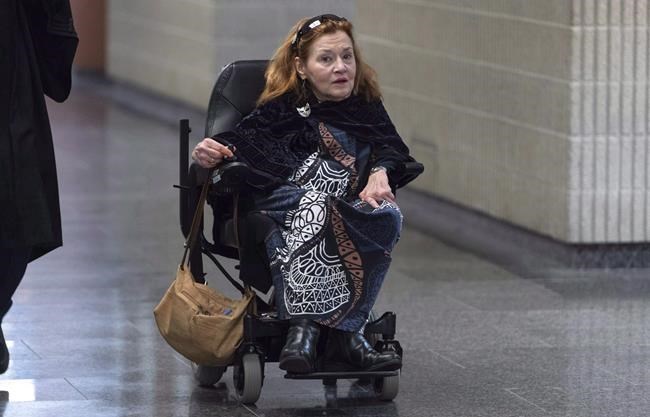OTTAWA — Nicole Gladu has no time for the argument that she's a vulnerable person who needs to be protected from being coerced into seeking a medically assisted death.
The 75-year-old Quebecer uses a wheelchair due to post-polio syndrome, a degenerative condition that has over the past 25 years reactivated childhood scoliosis, weakened her muscles, distorted her body and made it hard to breathe.
But she still lives independently in a 14th-floor condo with a beautiful view and cherishes her autonomy — including the right to seek medical help to end her suffering when she decides it has become intolerable.
Gladu is one of two Quebecers who successfully challenged the constitutionality of the federal law's stipulation that medical assistance in dying (MAID) can only be provided to people whose natural death is "reasonably foreseeable."
As a result of the court ruling in her case, the Trudeau government has introduced Bill C-7, now before the Senate, to expand access to MAID for people who are not at the end of life.
Gladu dismisses as paternalistic critics who argue that the bill leaves vulnerable people with disabilities open to being pressured — either directly or indirectly through societal attitudes and a lack of support services — into receiving MAID.
"Vulnerability is a concept used ad nauseam by paternalistic people in good health (for) standing in the way of MAID," Gladu says.
She's equally dismissive of the argument — advanced by disability-rights groups and echoed by the majority of Conservative MPs — that the bill sends a message that life with a disability is not worth living.
"My life journey (75 years) proves that a handicap can stimulate a person to move back her limits."
Gladu spoke to The Canadian Press through emails because she was not feeling well enough for a phone interview.
Neither Gladu nor Jean Truchon, whose cerebral palsy had led him to lose the use of all four limbs, was eligible for an assisted death because they were not near the ends of their lives. They went to court to challenge the "foreseeable death" provision in the federal law and a similar provision in the Quebec law.
Last fall, Quebec Superior Court Justice Christine Baudouin struck down the foreseeable-death requirement and Quebec's end-of-life requirement as violations of the pair's charter rights to equal treatment under the law and to life, liberty and security of the person.
Bill C-7 is intended to bring the federal law into compliance with that ruling. It would scrap the foreseeable-death requirement but set up two tracks for eligibility for MAID: one with somewhat relaxed rules for those who are near death and a second with more stringent rules for those who are not.
Gladu says the bill is more or less consistent with Baudouin's ruling, although she notes that it would impose a short delay — 90 days — on assessing MAID requests from those not near death.
The bill has triggered strenuous objections from disability-rights groups and Conservative politicians, who maintain that people with debilitating disabilities are being discriminated against, singled out for MAID when they are not at the end of life and, thus, effectively being told that their lives are not of equal value.
They argue that many people with disabilities are marginalized, living in poverty and without the support services that would make their lives more fulfilling. For such people, choosing MAID is not a real choice, they contend.
But Gladu doesn't fit that description — which in part explains Baudouin's conclusion that each case must be assessed on its merits, that a blanket exclusion of people who aren't at the natural end of their lives is a violation of their charter rights.
Gladu says she has never missed anything needed for a full life. In her youth, her father, a teacher, gave her books that became her "passport to travel through life, expanding my imagination so I could dream my life before living my dreams."
Because of polio, contracted when she was four, Gladu was initially home-schooled. But she eventually went to university, became a journalist and worked abroad in Paris and then New York, where she was a press attaché at the United Nations before returning to Quebec to retire.
"I am grateful to have lived my retirement on the 14th floor of a condominium building, which offers not only all the necessities, but also a breathtaking view of the river that mirrors the beauty of the sunsets," she says.
"My atypical journey is proof, I believe, of a very autonomous character, which will culminate with death."
Until the law is changed to scrap the end-of-life criterion, Baudouoin gave Gladu and Truchon, and others in similar positions, the right to seek individual court exemptions to receive MAID.
Truchon, 51, died with medical assistance in April.
Gladu has not availed herself of the procedure but she says it gives her peace of mind knowing it's an option as her condition deteriorates.
As she said immediately after Baudouin's ruling: "Now, it's really a matter of personal decision. It's up to me or it's up to Mr. Truchon or other people like us to decide if we prefer the quality of life to the quantity of life."
This report by The Canadian Press was first published Dec. 16, 2020.
Joan Bryden, The Canadian Press
Note to readers: This is a corrected story. A previous version said Jean Truchon died in August.



